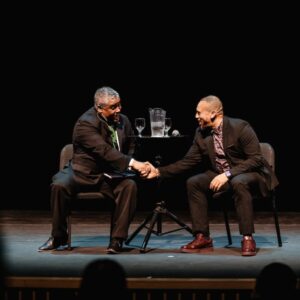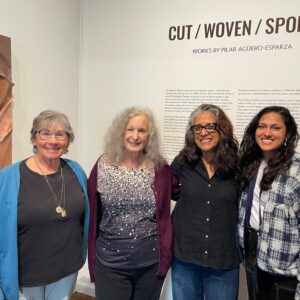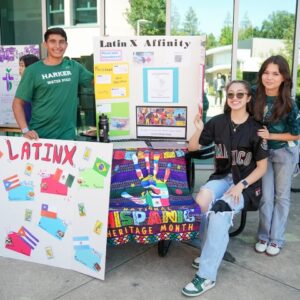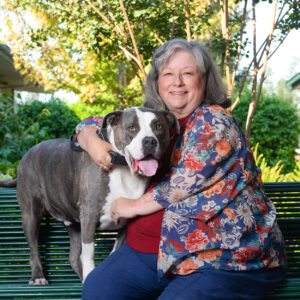This story originally appeared in the Spring/Summer 2023 issue of Harker Magazine. It is also available to read on issuu.
For all the laudable goals of diversity work, the people at the center of it – whose lives it is meant to improve – still encounter stresses unique to their experiences as marginalized people – stresses they sometimes grow tired of explaining. For these people, affinity groups have become a place on campus to alleviate these pressures.
“Affinity groups, for any culture, offer a safe space for those who identify under them to share experiences that outsiders may not understand completely,” said Makayla Aguilar-Zuniga, grade 12, a member of Harker’s Latinx Affinity Group. “Additionally, they bring a sense of belonging to people who struggle with connecting to their identity.”
Affinity groups, which have existed on university campuses since the early 1970s, are essentially spaces open only to people of specific, usually marginalized, identities. “Affinity groups are spaces for people who can speak from the ‘I’ perspective about their individual identity,” said Brian Davis, Harker’s director of diversity, equity and inclusion (DEI). “It’s a space where you can learn a little bit more about who you are or your history.” During meetings, which are attended by faculty advisors, students in these groups discuss topics that affect them and others who share their identities and develop ways to approach the wider community with their ideas and concerns.
These forums differ from other campus advocacy organizations such as the Gender-Sexuality Alliance (GSA), which is also open to allies who do not identify as LGBTQ+. “Our school has the incredible privilege of having a Gender-Sexuality Alliance, but even this space can sometimes feel intimidating to students who wish to have an escape from the stresses of discourse,” said one non-binary student leader of the Transgender Affinity Group who wished to not be named. While they said allyship is a key aspect of diversity work, affinity groups can function as support groups that are “meant to give students a breather and an area where they are not required to explain how or why they experience something.”
Senior KJ Williams, a member of the Black Student Union (Harker’s first officially recognized affinity group, established in 2020), found that the experience of meeting and talking with other Black students made him feel more valued at school. “It made me feel more comfortable at Harker and made me feel, because the school let us have this space, that they valued my presence here,” he said. “When you have that support system, wherever you are, it makes you feel more welcomed.”
Students of other affinity groups also have found them to be a space where they can openly discuss topics related to their identities among people who share their lived experiences. Senior Ayla Apsey of the Middle Eastern Student Association said Middle Eastern students are hesitant to discuss concerns “because they might feel judged or don’t want to offend anyone else,” she said. “So it’s more of a safe space for us to just discuss how we feel.”
Reza Jalil, grade 11, a member of the Muslim Student Association, found that being in the group was another source of learning about his faith. “I felt like I couldn’t connect to anyone about this,” he said. “But now … I’m able to connect and learn more about our religion.” In turn, he says, this enabled him to talk about Islam with others more confidently. “I’ve been reached out to by teachers who I don’t even know on campus,” he said, “and they ask questions that I can honestly answer and teach them about our religion.”
Likewise, the Jewish Affinity Group enables students to meet and celebrate their heritage with others they don’t usually see at school. “We celebrate the holidays with any Jewish kids around campus, and it’s honestly just been super beneficial to have that community without it being super structured,” said junior Sarah Westgate, a member of the group. “It’s really nice to be around people who fully understand your identity, and we have little inside jokes that we understand, even if we didn’t go to Hebrew school at the same place.”
Other groups have had similar experiences, finding that discussing issues specific to their communities enables them to share their knowledge and concerns more comfortably with the wider Harker community. In one meeting, Apsey said, “we talked about Ramadan, because a lot of Middle Eastern students are fasting, and we had an open discussion about how difficult it is for people who are fasting during the day.”
Aguilar-Zuniga recalled one incident in which a Salvadoran dress she wore during Harker’s Culture Day was incorrectly referred to as a Mexican huipil. “Usually, I would have pointed it out to a few people but ultimately let it go since it was a common occurrence,” she said. After discussing the matter with the Latinx Affinity Group’s advisor, math teacher Jeanette Fernandez, she devised a way to communicate her concerns to the other party. “Since then, I have not faced a similar issue. With the help from the Latinx Affinity Group, I felt supported in ways that I had never been and I know that many in the group share the same sentiment.”
Another positive outcome of affinity groups, Williams said, was seeing more students willing to share aspects of their heritage with the Harker community. “When someone talks about their culture to you, or someone shares something with you, it’s easier to feel comfortable enough to share your identity, your truth.” He cited this year’s Culture Day, which grew exponentially over the previous year, as evidence. “Last year we had a decent number of booths,” he said. “But this year, we had way more because people realized, ‘oh wow, this is really cool that people are showing their heritage.’”
Discussions in the Latinx Affinity Group led to the decision to give a special dance performance at Culture Day. “We were unsure if we wanted to perform at all, because of the difficulty of the dance, but we decided that the benefit of showcasing our culture would outweigh the struggles,” Aguilar-Zuniga said.
In anticipation of others expressing misgivings about affinity groups being exclusionary, students in these groups maintain that their goals are quite the opposite. “Affinity groups aren’t meant to make other people feel excluded,” Williams said. “Their main purpose is to make those that are excluded, or feel excluded, feel more included in the community. Having those spaces allows everyone in the community to feel comfortable, not just the majority.”














